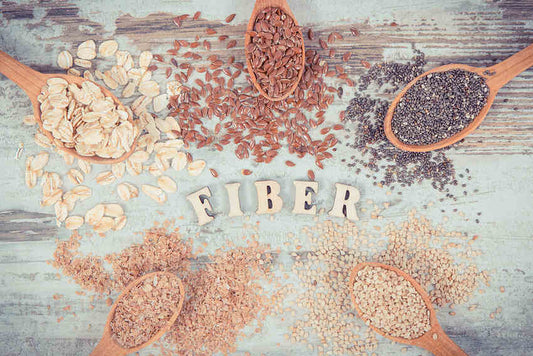There’s been a lot of buzz about probiotics lately. Whether it’s supporting good gut health, managing weight, or improving skin health, there seems to be a long list of benefits associated with increasing your intake.
Several studies have looked at the impacts of gut health on overall health, and it all starts with the beneficial bacteria residing in the GI tract.
There are several strains of probiotics present in the gut, but there’s a common feat they all need: prebiotics. Like humans, bacteria need food to thrive, and prebiotics serve as that food.
Although many types of prebiotics exist, we’re breaking down the details on a specific one—inulin-FOS. We’ll cover what it is, how it works, and the benefits of consuming inulin-FOS.
Ready to dive in?
What Are Prebiotics?
Before we dive into inulin-FOS, we first need to cover the basics.
Most people know about probiotics but are unfamiliar with prebiotics—a type of non-fermentable fiber that feeds the beneficial bacteria in the gut.
Prebiotics are “a substrate that is selectively utilized by host microorganisms conferring a health benefit” 1.
Essentially, they’re food for the gut. Because prebiotic fiber is indigestible by human enzymes but not bacteria, it offers different functions and health benefits than other fibers.
The good bacteria, in turn, produce short-chain fatty chain acids like butyrate, essential for nourishing gut lining cells, immune function, and more.
But what’s interesting is that when we don’t supply enough food to keep the good gut bugs happy and healthy, they will find fuel from other sources.
Some animal research suggests that bacteria will eat the mucous later in the gut, which functions to protect your body against invasion by potentially harmful pathogens.
However, research on this is minimal. If that mucous layer isn’t there or isn’t fully intact, it can lead to a host of adverse effects.
In any sense, you can think of prebiotics like fructose oligosaccharides (FOS) as microbiome fertilizers—they’re the equivalent of vitamin or mineral supplements that promote the growth and proliferation of select microbes in the gut 2.
By consuming sufficient amounts of prebiotics, we can improve the number and diversity of microbes in the gut, which benefits overall health and well-being.
But it’s important to remember that while most prebiotics are a type of fiber, not all fibers are prebiotics!
To be classified as a prebiotic fiber, it must pass through the gastrointestinal tract intact and undigested, stimulating the growth and activity of specific trains of good bacteria in the large intestines 3.
Some examples of prebiotics include inulin, fructans, and galactooligosaccharides (GOS).
What Is Inulin-FOS?
Now that you’re familiar with prebiotics, let’s dig into the good—all about inulin.
Inulin is a soluble plant fiber found in many plant species, with exceptionally high amounts found in chicory root. You’ll also find plenty of inulin if you’re a fan of bananas, onions, garlic, asparagus, and Jerusalem artichokes.
Because humans don’t have the enzymes needed to break these fibers down, they travel through the GI tract relatively intact and untouched.
And while it may seem counterproductive to eat things that aren’t digested and don’t contribute nutrients, hold your fire—they offer plenty of benefits even though they aren’t digested.
Dietary fibers like inulin have been part of the human diet for decades thanks to their benefits for bowel regularity, digestive health, heart health, and more.
But technically speaking, inulin is a type of fructan, oligofructose carbohydrate 4. It’s naturally found in the roots and stems of plants and serves as a source of energy. And although you don’t think about fiber as a source of sugar, it is.
Inulin contains 75% fewer calories than white sugar per gram and has minimal effect on blood glucose, making it an excellent option for people with diabetes or blood sugar imbalances. And because it has osmotically active properties, it resists breakdown by digestive enzymes.
As with most fibers, their digestion by bacteria targets specific strains. Inulin-type fructans have a specific colonic fermentation directed toward bifidobacteria, which can break down and use these fibers because they possess the fructofuranosidase enzyme 5. As a result, they have an advantage in a mixed species environment like the gut.
When it comes to the benefits of inulin, there’s no shortage of them—and we will cover them below!
How Does Inulin-FOS Differ From Other Fibers?
In the world of fiber, there are plenty to choose from. For most people, a fiber supplement with psyllium is the go-to. And while you may think psyllium and inulin have the same effect, they don’t.
Psyllium husk is extracted from the husks of the Plantago ovata plant’s seeds and is prized for its beneficial effects on digestion and cholesterol levels 6. But why is psyllium so popular as a fiber supplement? You can thank its absorptive capacity for that.
Because psyllium absorbs more water than other types of fiber, it ferments less in the gut and expands and forms a sticky compound. As it moves through the GI tract, it helps to regulate bowel activity, prevent constipation, and improve diarrhea.
On top of that, we also have other types of soluble fiber, all of which confer their benefits. Some of them include:
- Beta-glucans (heart health)
- Pectins and gums (digestion, cholesterol)
- Polydextrose polyols (bowel health)
- Resistance starch (weight, blood sugar)
- Wheat dextrin (cholesterol)
However, compare psyllium to something like inulin, which has a lower absorptive capacity, so it doesn’t offer the same laxative effects. Instead, inulin benefits immune function, gut health, heart health, and more.
Benefits Of Inulin-FOS
1. Relieves constipation
Constipation is never pleasant to deal with. It’s painful, uncomfortable, and downright embarrassing—but it happens to many people. Although there are several underlying reasons for constipation, lack of fiber can be a big one.
Because inulin forms a gel-like substance upon consumption, it helps to lubricate the GI tract, keep things regular, and reduce the risk of hemorrhoids.
In addition to bulking up the stool and making it easier to pass, inulin can also increase bowel movement frequency thanks to being rapidly fermented in the colon and feeding the beneficial bacteria that regulate bowel function 7, 8.
On top of bulking up stools and increasing fecal biomass and water content, it also helps to improve bowel movement frequency because it rapidly ferments in the colon to feed the beneficial bacteria 5, 6.
A 2017 study looked at the effects of inulin supplementation on constipation and found that just 4g of Orafti® Inulin three times daily in chronically constipated adults results in significant improvements in bowel function 9.
2. Promotes better gut health
Gut health is paramount for overall health and well-being. While most people think about gut health solely in relation to digestion, it has profound effects on weight, immune function, cognition, and so much more. So, getting your gut health under wraps is essential—and inulin-FOS can help.
Studies find that consumption of inulin-type fructans can lead to beneficial modifications of gut microbiota composition and function 10.
Specifically, they increase the proportion of Bifidobacterium genus, decrease unclassified Clostridiales, and favor a decrease in Oxalobacteraceae. On top of that, they can also alter eating behaviors, such as increasing satiety and reducing cravings.
Other research shows that oligofructose acts like a prebiotic to enhance gut lining and colonic health, alter gut biodiversity, and modulate endocrine and immune functions 11.
And because it supports the growth and proliferation of certain beneficial bacterial strains, it can help to reduce harmful inflammatory bacteria.
3. May improve cholesterol levels
Cholesterol levels are a significant indicator of overall heart health and the risk of heart disease. While lifestyle changes can profoundly impact cholesterol levels, including more fiber in your diet has also been shown to elicit powerful benefits.
As a prebiotic fiber, inulin undergoes fermentation in various parts of the intestine, producing short-chain fatty acids (SCFA). Research has shown SCFA may regulate metabolic pathways in the liver and other organs, thereby having physiological health effects.
However, there’s a lot of conflicting information about inulin and its impact on cholesterol. Some research suggests that gut-derived SCFA may serve as a precursor for cholesterol and fatty acid synthesis, thereby eliciting adverse effects on metabolism by increasing plasma cholesterol levels 12.
Other research suggests that oligofructose and inulin can lower plasma cholesterol. This may be because inulin is a soluble and viscous compound that increases the thickness of the small intestine’s unstirred layer, inhibiting cholesterol absorption 13.
4. Enhances calcium absorption
Bone degeneration is one of the most pervasive worldwide issues. Reducing the risk of osteoporosis and bone fractures is a huge issue, with over 28 million people in the United States having osteoporosis or low bone mass 14.
While several other dietary and lifestyle changes are needed to improve bone health, increasing the bioavailability and absorption of calcium can help ensure bones remain strong and healthy—prebiotics have shown positive effects on bone structure via their ability to enhance mineral absorption.
The distal portion of the intestine is one of the primary sites of calcium absorption, which is stimulated by chemical changes and increases in acid fermentation of prebiotic dietary fibers 15.
Although studies are mixed, some show that inulin, oligofructose, galactooligosaccharides (GOSs), and short-chain FOSs significantly increase calcium absorption 15.
However, absorption capacity may be affected by age and physiology. Other studies show similar results, with inulin supplementation of at least 8-10 g/day enhancing calcium absorption and total body bone mineral content/density in adolescents, postmenopausal women, and adult men 16.
Let’s summarize some of the benefits of prebiotic fiber:
- Increases Bifidobacteria and Lactobacilli levels
- Promotes production of beneficial metabolites
- Enhances calcium absorption
- Decreases protein fermentation
- Decreases pathogenic (harmful) bacteria populations
- Improves immune system defenses
Final Thoughts
So, whether you’re looking for better gut health, a stronger immune system, or better mineral absorption, there’s no harm in adding a prebiotic fiber like inulin-FOS to your diet. And if you’re not a fan of the foods inulin is found in, don’t panic—we have you covered.
Performance Lab Prebiotic is your ultimate fix. It’s a 2-in-1 soluble fiber and probiotic stack designed for peak metabolic and microbiome performance.

Rather than introducing new bacterial strains to your gut, Prebiotic nourishes your existing probiotic colony with Orafti® Synergy1 (Inulin-FOS from chicory root) for robust growth and health.
As a result, Prebiotic delivers more reliable, natural, and comfortable microbiome support. And with the addition of fiber, you’re also getting benefits for digestion, immune function, fat loss, and more!
References
- Gibson GR, Hutkins R, Sanders ME, et al. Expert consensus document: The International Scientific Association for Probiotics and Prebiotics (ISAPP) consensus statement on the definition and scope of prebiotics. Nat Rev Gastroenterol Hepatol. 2017;14(8):491-502.
- Appanna VD. Dysbiosis, Probiotics, and Prebiotics: In Diseases and Health. Human Microbes - The Power Within. 2018;81-122.
- Holscher HD. Dietary fiber and prebiotics and the gastrointestinal microbiota. Gut Microbes. 2017;8(2):172-184.
- Kolida S, Gibson GR. Prebiotic capacity of inulin-type fructans. J Nutr. 2007;137(11 Suppl):2503S-2506S.
- Playne MJ, Crittenden R. Commercially available oligosaccharides. Bull Int Dairy J. 1996;313:10-22.
- Fischer MH, Yu N, Gray GR, Ralph J, Anderson L, Marlett JA. The gel-forming polysaccharide of psyllium husk (Plantago ovata Forsk). Carbohydr Res. 2004;339(11):2009-2017.
- Den Hond E, Geypens B, Ghoos Y. Effect of high performance chicory inulin on constipation. Nutrition Research. 2000; 20(5):731-736.
- Database of Abstracts of Reviews of Effects (DARE): Quality-assessed Reviews . York (UK): Centre for Reviews and Dissemination (UK); 1995-. Effectiveness of inulin intake on indicators of chronic constipation; a meta-analysis of controlled randomized clinical trials.
- Micka A, Siepelmeyer A, Holz A, Theis S, Schön C. Effect of consumption of chicory inulin on bowel function in healthy subjects with constipation: a randomized, double-blind, placebo-controlled trial. Int J Food Sci Nutr. 2017;68(1):82-89.
- Hiel S, Bindels LB, Pachikian BD, et al. Effects of a diet based on inulin-rich vegetables on gut health and nutritional behavior in healthy humans. Am J Clin Nutr. 2019;109(6):1683-1695.
- Roberfroid MB. Introducing inulin-type fructans. Br J Nutr. 2005;93 Suppl 1:S13-S25.
- Mistry RH, Gu F, Schols HA, Verkade HJ, Tietge UJF. Effect of the prebiotic fiber inulin on cholesterol metabolism in wildtype mice. Sci Rep. 2018;8(1):13238.
- Liu F, Prabhakar M, Ju J, Long H, Zhou HW. Effect of inulin-type fructans on blood lipid profile and glucose level: a systematic review and meta-analysis of randomized controlled trials. Eur J Clin Nutr. 2017;71(1):9-20.
- Cashman KD. Calcium intake, calcium bioavailability, and bone health. Br J Nutr. 2002;87 Suppl 2:S169-S177.
- Carlson JL, Erickson JM, Lloyd BB, Slavin JL. Health Effects and Sources of Prebiotic Dietary Fiber. Curr Dev Nutr. 2018;2(3):nzy005.
- Bakirhan H, Karabudak E. Effects of inulin on calcium metabolism and bone health . Int J Vitam Nutr Res. 2021;1-12.















